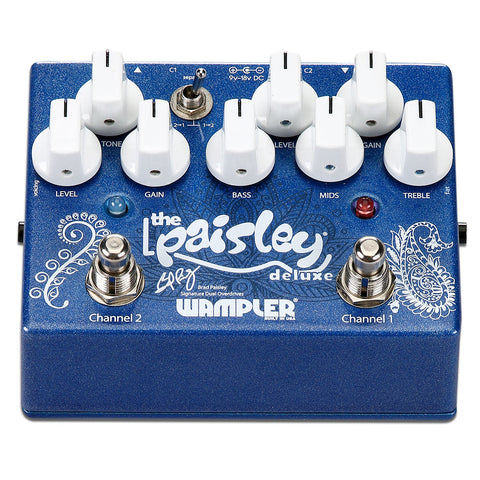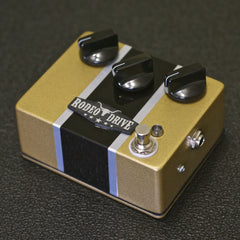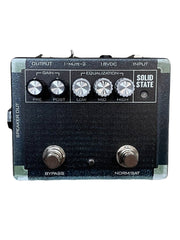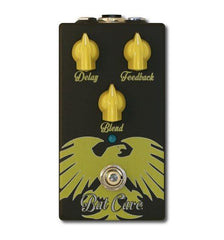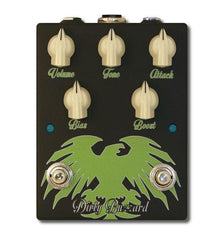Welcome To Steve's Music Center !
Wampler Brad Paisley Deluxe
Wampler
Wampler Brad Paisley Deluxe
Wampler's relationship with Brad Paisley goes back to a time way before his signature Paisley Drive pedal.... in fact, thanks to the way it produced similar tones to the lauded Nobels ODR-S with more control for fine-tuning his sound, the first Wampler pedal Brad fell in love with was the since-discontinued Underdog overdrive. It's with this in mind that Wampler combined Brad's two favorite Wampler tones in the Paisley Deluxe dual overdrive pedal. By cramming a Paisley Drive and Brian's Underdog circuits into a single pedal, Wampler is delivering the ultimate Brad Paisley pedal. Not only do you have independent access to both tones, but you are able to stack them for more harmonically rich drive in any order you want. And taking a cue from Wampler's popular Tom Quayle signature Dual Fusion's groundbreaking signal routing, you're able to run each side of the Paisley Deluxe as an individual pedal, perfect for today's pedal switcher-based rigs. Whether you're looking to nail Brad's gorgeous signature tones or are looking for a great-sounding overdrive with unbelievable flexibility, you can't go wrong with the Wampler Paisley Deluxe.
Brad Paisley's Tone, Your Tone
There's been a lot of demand for Wampler's long-since-discontinued Underdog overdrive pedal. And a lot of that demand comes from Brad Paisley. So to improve upon his already great-sounding Paisley Drive, Wampler provides you access to the Underdog's Nobels-like grit right alongside Brad's signature tone.
- Channel 1 replicates the distinctive Underdog overdrive that continues to inspire Brad
- Channel 2 is the same versatile, amp-like drive of the Paisley Drive
- Each channel can be run independently or stacked in any order you choose
Signal routing versatility
To integrate with today's super-powerful pedal switchers and MIDI-based rigs, Wampler outfitted the Paisley Deluxe with the ability to route your signal to each channel individually. With a simple stomp of your programmed switcher, you're able to pull up either channel or a blend of both. It truly is like having two Brad Paisley-approved overdrive pedals in one box.
- Independent in and out jacks for each channel
- Channels are individually selectable via pedal switchers
- Can be run as two independent pedals or stacked either way
Choosing “stacked” vs. “separate” channel switching
The toggle switch has 3 settings: 2>1, Separate, and 1>2.
Looking at the top of the pedal, the input jacks are on the right side (with an arrow pointing towards the knobs) and the output jacks are on the left side (with an arrow pointing away from the knobs). C1 means “channel 1” and C2 means “channel 2” on the jacks.
When in 2>1 mode and both channels are “on”, the guitar is routed into channel 2, then channel 1. The input cable from the guitar needs to be moved to the “C2” input jack, and the output cable to the amp needs to be moved to “C1” output jack. When in 1>2 mode and both channels are “on”, the guitar is routed into channel 1, then channel 2. The input cable from the guitar needs to be moved to the “C1” input jack and the output cable to the amp needs to be moved to the “C2” output jack. When the toggle is in the middle it is in “separate” mode, and the pedal can be used as two individual pedals, both with its respective input and output jack.
Please note that if the cables are not in the correct place, the toggle switch and effect will not work properly, but no damage is done.
Wampler-quality construction
Brian Wampler’s attention to detail and commitment to designing the best and most player-friendly products out there are second to none. Those qualities are on full display within the Paisley Deluxe. From its convenient top-mounted jacks to its amazingly flexible switching, the Paisley Deluxe dual overdrive pedal is every bit a Wampler.
Wampler's relationship with Brad Paisley goes back to a time way before his signature Paisley Drive pedal.... in fact, thanks to the way it produced similar tones to the lauded Nobels ODR-S with more control for fine-tuning his sound, the first Wampler pedal Brad fell in love with was the since-discontinued Underdog overdrive. It's with this in mind that Wampler combined Brad's two favorite Wampler tones in the Paisley Deluxe dual overdrive pedal. By cramming a Paisley Drive and Brian's Underdog circuits into a single pedal, Wampler is delivering the ultimate Brad Paisley pedal. Not only do you have independent access to both tones, but you are able to stack them for more harmonically rich drive in any order you want. And taking a cue from Wampler's popular Tom Quayle signature Dual Fusion's groundbreaking signal routing, you're able to run each side of the Paisley Deluxe as an individual pedal, perfect for today's pedal switcher-based rigs. Whether you're looking to nail Brad's gorgeous signature tones or are looking for a great-sounding overdrive with unbelievable flexibility, you can't go wrong with the Wampler Paisley Deluxe.
Brad Paisley's Tone, Your Tone
There's been a lot of demand for Wampler's long-since-discontinued Underdog overdrive pedal. And a lot of that demand comes from Brad Paisley. So to improve upon his already great-sounding Paisley Drive, Wampler provides you access to the Underdog's Nobels-like grit right alongside Brad's signature tone.
- Channel 1 replicates the distinctive Underdog overdrive that continues to inspire Brad
- Channel 2 is the same versatile, amp-like drive of the Paisley Drive
- Each channel can be run independently or stacked in any order you choose
Signal routing versatility
To integrate with today's super-powerful pedal switchers and MIDI-based rigs, Wampler outfitted the Paisley Deluxe with the ability to route your signal to each channel individually. With a simple stomp of your programmed switcher, you're able to pull up either channel or a blend of both. It truly is like having two Brad Paisley-approved overdrive pedals in one box.
- Independent in and out jacks for each channel
- Channels are individually selectable via pedal switchers
- Can be run as two independent pedals or stacked either way
Choosing “stacked” vs. “separate” channel switching
The toggle switch has 3 settings: 2>1, Separate, and 1>2.
Looking at the top of the pedal, the input jacks are on the right side (with an arrow pointing towards the knobs) and the output jacks are on the left side (with an arrow pointing away from the knobs). C1 means “channel 1” and C2 means “channel 2” on the jacks.
When in 2>1 mode and both channels are “on”, the guitar is routed into channel 2, then channel 1. The input cable from the guitar needs to be moved to the “C2” input jack, and the output cable to the amp needs to be moved to “C1” output jack. When in 1>2 mode and both channels are “on”, the guitar is routed into channel 1, then channel 2. The input cable from the guitar needs to be moved to the “C1” input jack and the output cable to the amp needs to be moved to the “C2” output jack. When the toggle is in the middle it is in “separate” mode, and the pedal can be used as two individual pedals, both with its respective input and output jack.
Please note that if the cables are not in the correct place, the toggle switch and effect will not work properly, but no damage is done.
Wampler-quality construction
Brian Wampler’s attention to detail and commitment to designing the best and most player-friendly products out there are second to none. Those qualities are on full display within the Paisley Deluxe. From its convenient top-mounted jacks to its amazingly flexible switching, the Paisley Deluxe dual overdrive pedal is every bit a Wampler.
- See more at: http://wamplerpedals.com/paisley-drive-deluxe#sthash.15Wswgol.dpufWampler's relationship with Brad Paisley goes back to a time way before his signature Paisley Drive pedal.... in fact, thanks to the way it produced similar tones to the lauded Nobels ODR-S with more control for fine-tuning his sound, the first Wampler pedal Brad fell in love with was the since-discontinued Underdog overdrive. It's with this in mind that Wampler combined Brad's two favorite Wampler tones in the Paisley Deluxe dual overdrive pedal. By cramming a Paisley Drive and Brian's Underdog circuits into a single pedal, Wampler is delivering the ultimate Brad Paisley pedal. Not only do you have independent access to both tones, but you are able to stack them for more harmonically rich drive in any order you want. And taking a cue from Wampler's popular Tom Quayle signature Dual Fusion's groundbreaking signal routing, you're able to run each side of the Paisley Deluxe as an individual pedal, perfect for today's pedal switcher-based rigs. Whether you're looking to nail Brad's gorgeous signature tones or are looking for a great-sounding overdrive with unbelievable flexibility, you can't go wrong with the Wampler Paisley Deluxe.
Brad Paisley's Tone, Your Tone
There's been a lot of demand for Wampler's long-since-discontinued Underdog overdrive pedal. And a lot of that demand comes from Brad Paisley. So to improve upon his already great-sounding Paisley Drive, Wampler provides you access to the Underdog's Nobels-like grit right alongside Brad's signature tone.
- Channel 1 replicates the distinctive Underdog overdrive that continues to inspire Brad
- Channel 2 is the same versatile, amp-like drive of the Paisley Drive
- Each channel can be run independently or stacked in any order you choose
Signal routing versatility
To integrate with today's super-powerful pedal switchers and MIDI-based rigs, Wampler outfitted the Paisley Deluxe with the ability to route your signal to each channel individually. With a simple stomp of your programmed switcher, you're able to pull up either channel or a blend of both. It truly is like having two Brad Paisley-approved overdrive pedals in one box.
- Independent in and out jacks for each channel
- Channels are individually selectable via pedal switchers
- Can be run as two independent pedals or stacked either way
Choosing “stacked” vs. “separate” channel switching
The toggle switch has 3 settings: 2>1, Separate, and 1>2.
Looking at the top of the pedal, the input jacks are on the right side (with an arrow pointing towards the knobs) and the output jacks are on the left side (with an arrow pointing away from the knobs). C1 means “channel 1” and C2 means “channel 2” on the jacks.
When in 2>1 mode and both channels are “on”, the guitar is routed into channel 2, then channel 1. The input cable from the guitar needs to be moved to the “C2” input jack, and the output cable to the amp needs to be moved to “C1” output jack. When in 1>2 mode and both channels are “on”, the guitar is routed into channel 1, then channel 2. The input cable from the guitar needs to be moved to the “C1” input jack and the output cable to the amp needs to be moved to the “C2” output jack. When the toggle is in the middle it is in “separate” mode, and the pedal can be used as two individual pedals, both with its respective input and output jack.
Please note that if the cables are not in the correct place, the toggle switch and effect will not work properly, but no damage is done.
Wampler-quality construction
Brian Wampler’s attention to detail and commitment to designing the best and most player-friendly products out there are second to none. Those qualities are on full display within the Paisley Deluxe. From its convenient top-mounted jacks to its amazingly flexible switching, the Paisley Deluxe dual overdrive pedal is every bit a Wampler.
- See more at: http://wamplerpedals.com/paisley-drive-deluxe#sthash.15Wswgol.dpufWampler's relationship with Brad Paisley goes back to a time way before his signature Paisley Drive pedal.... in fact, thanks to the way it produced similar tones to the lauded Nobels ODR-S with more control for fine-tuning his sound, the first Wampler pedal Brad fell in love with was the since-discontinued Underdog overdrive. It's with this in mind that Wampler combined Brad's two favorite Wampler tones in the Paisley Deluxe dual overdrive pedal. By cramming a Paisley Drive and Brian's Underdog circuits into a single pedal, Wampler is delivering the ultimate Brad Paisley pedal. Not only do you have independent access to both tones, but you are able to stack them for more harmonically rich drive in any order you want. And taking a cue from Wampler's popular Tom Quayle signature Dual Fusion's groundbreaking signal routing, you're able to run each side of the Paisley Deluxe as an individual pedal, perfect for today's pedal switcher-based rigs. Whether you're looking to nail Brad's gorgeous signature tones or are looking for a great-sounding overdrive with unbelievable flexibility, you can't go wrong with the Wampler Paisley Deluxe.
Brad Paisley's Tone, Your Tone
There's been a lot of demand for Wampler's long-since-discontinued Underdog overdrive pedal. And a lot of that demand comes from Brad Paisley. So to improve upon his already great-sounding Paisley Drive, Wampler provides you access to the Underdog's Nobels-like grit right alongside Brad's signature tone.
- Channel 1 replicates the distinctive Underdog overdrive that continues to inspire Brad
- Channel 2 is the same versatile, amp-like drive of the Paisley Drive
- Each channel can be run independently or stacked in any order you choose
Signal routing versatility
To integrate with today's super-powerful pedal switchers and MIDI-based rigs, Wampler outfitted the Paisley Deluxe with the ability to route your signal to each channel individually. With a simple stomp of your programmed switcher, you're able to pull up either channel or a blend of both. It truly is like having two Brad Paisley-approved overdrive pedals in one box.
- Independent in and out jacks for each channel
- Channels are individually selectable via pedal switchers
- Can be run as two independent pedals or stacked either way
Choosing “stacked” vs. “separate” channel switching
The toggle switch has 3 settings: 2>1, Separate, and 1>2.
Looking at the top of the pedal, the input jacks are on the right side (with an arrow pointing towards the knobs) and the output jacks are on the left side (with an arrow pointing away from the knobs). C1 means “channel 1” and C2 means “channel 2” on the jacks.
When in 2>1 mode and both channels are “on”, the guitar is routed into channel 2, then channel 1. The input cable from the guitar needs to be moved to the “C2” input jack, and the output cable to the amp needs to be moved to “C1” output jack. When in 1>2 mode and both channels are “on”, the guitar is routed into channel 1, then channel 2. The input cable from the guitar needs to be moved to the “C1” input jack and the output cable to the amp needs to be moved to the “C2” output jack. When the toggle is in the middle it is in “separate” mode, and the pedal can be used as two individual pedals, both with its respective input and output jack.
Please note that if the cables are not in the correct place, the toggle switch and effect will not work properly, but no damage is done.
Wampler-quality construction
Brian Wampler’s attention to detail and commitment to designing the best and most player-friendly products out there are second to none. Those qualities are on full display within the Paisley Deluxe. From its convenient top-mounted jacks to its amazingly flexible switching, the Paisley Deluxe dual overdrive pedal is every bit a Wampler.
- See more at: http://wamplerpedals.com/paisley-drive-deluxe#sthash.15Wswgol.dpuf